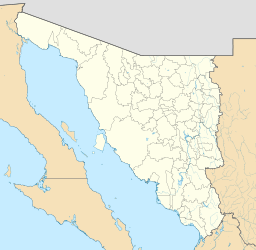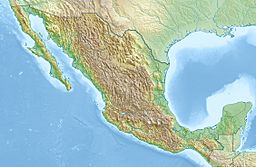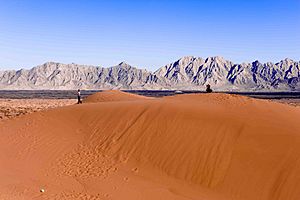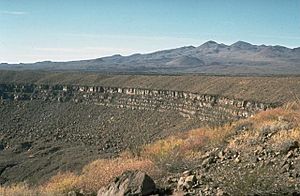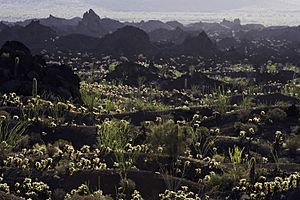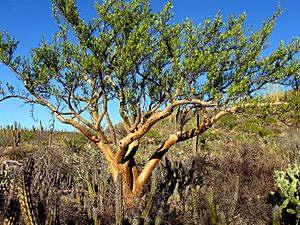Pinacate Peaks facts for kids
Quick facts for kids Pinacate Peaks |
|
|---|---|
| Cuk Doʼag Sierra del Pinacate |
|
| Highest point | |
| Geography | |
| Location | (north-central)-Sonoran Desert El Pinacate y Gran Desierto de Altar, Sonora, Mexico |
The Pinacate Peaks (also known as Sierra Pinacate or O'odham: Cuk Doʼag) are a group of volcanoes and cinder cones. They are mostly in the Mexican state of Sonora. This area is right next to the U.S. state of Arizona. The peaks are surrounded by huge sand dunes called the Gran Desierto de Altar.
The name Sierra Pinacate is the Spanish name for this volcanic area. It is used in Mexico, where these peaks are located.
Contents
Where Are the Pinacate Peaks?
The Pinacate Peaks are found just north of Puerto Peñasco, a popular fishing town. The tallest peak is called Cerro del Pinacate. It is also known as Volcan Santa Clara. This peak reaches about 3,904 feet (1,190 meters) high. The word pinacate comes from a local word for a desert stink beetle.
Amazing Natural History
How the Volcanoes Formed
The volcanoes in this area have erupted many times. This has happened over a long period, starting about 4 million years ago. Scientists think this activity is linked to the creation of the Gulf of California. The last time these volcanoes erupted was about 11,000 years ago. The Pinacate Desert also has the largest sand dunes in all of the Americas.
Plants and Animals of Pinacate
Many different plants and animals live in the Pinacate Mountains. One unique plant is the Elephant Tree. It has a very thick, sculptural trunk.
Human History at Pinacate
Padre Eusebio Kino was a priest who started many Spanish missions in the Sonoran Desert. He explored this area in 1698 and visited several times after that.
Later, NASA sent astronauts here for training. Starting in 1965, they used the area to practice for moon missions. The landscape here is very similar to the moon's surface. Astronauts like Apollo 14's Alan Shepard and Ed Mitchell trained here. Apollo 17's Jack Schmitt also trained here in February 1970. They even used models of lunar equipment.
El Pinacate y Gran Desierto de Altar Biosphere Reserve
The El Pinacate y Gran Desierto de Altar Biosphere Reserve is a special protected area. In Spanish, it is called Reserva de la Biosfera el Pinacate y Gran Desierto de Altar. The Mexican Federal Government manages this reserve. They work with the government of the State of Sonora to protect it.
Facts About the Reserve
Here are some interesting facts about this amazing reserve:
- It covers over 600 square miles (1,550 square kilometers).
- There are more than 400 cinder cones, which are small hills formed by volcanic eruptions.
- You can find 9 huge volcanic craters here.
- The area has many signs of past volcanic activity. These include volcanic ash, basalt rock, and lava fields.
- Over 560 different plant species grow in the reserve.
- It is home to 56 different mammal species.
- There are 43 different reptile species.
- You can spot 222 different bird species.
- Four different fish species live in the waters here.
See also
 In Spanish: Sierra del Pinacate para niños
In Spanish: Sierra del Pinacate para niños
 | Leon Lynch |
 | Milton P. Webster |
 | Ferdinand Smith |


